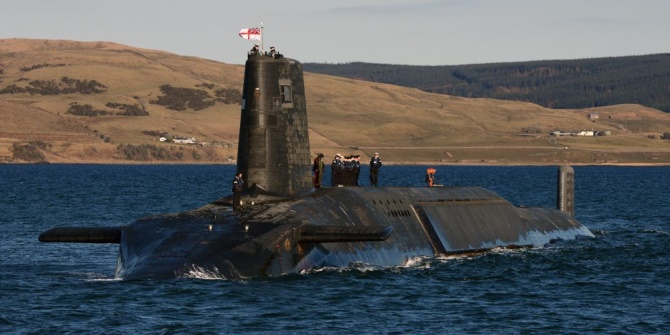 Should the UK and the United States intervene in sovereign states such as Iraq to promote democracy, free trade and other liberal objectives? Beate Jahn writes that this form of intervention, often termed ‘liberal internationalism’, has at best produced mixed results in states where it has been pursued. She argues that while these failures have typically been explained in terms of inadequate policy design or implementation, the real reason they fail is that the doctrine of liberalism itself contains a number of internal contradictions. Chief among these are that liberal states promote free trade abroad while retaining protectionism at home, and that liberal states advocate economic policies which are against the interests of the populations in foreign countries – thereby contradicting the promotion of democracy.
Should the UK and the United States intervene in sovereign states such as Iraq to promote democracy, free trade and other liberal objectives? Beate Jahn writes that this form of intervention, often termed ‘liberal internationalism’, has at best produced mixed results in states where it has been pursued. She argues that while these failures have typically been explained in terms of inadequate policy design or implementation, the real reason they fail is that the doctrine of liberalism itself contains a number of internal contradictions. Chief among these are that liberal states promote free trade abroad while retaining protectionism at home, and that liberal states advocate economic policies which are against the interests of the populations in foreign countries – thereby contradicting the promotion of democracy.
One of the key debates over foreign policy issues like the on-going crisis in Iraq is whether states should intervene in other sovereign countries to promote liberal objectives, such as democracy and free trade. This doctrine of intervention, often referred to as ‘liberal internationalism’, aims to spread liberal principles, practices and institutions abroad.
The outcome of these policies, however, is at best mixed. And yet, liberal actors continue to pursue these policies assuming that the problem lies with a lack of commitment, policy design and implementation. In fact, however, it is the contradictory nature of liberalism itself that is responsible for the failure of these policies.
Liberalism’s internal contradictions
In theory, liberalism assumes that private property provides the basis for individual freedom. Individual freedom requires government by consent, or democracy. And the main task of such a liberal government lies in the protection of private property – and therefore individual freedom.

In practice, however, where the majority of the population does not own private property but depends for its livelihood on common property, it has no interest in the protection or expansion of private property. And it is this disjuncture between liberal theory and the situation on the ground that generates fundamental contradictions within liberalism.
Historically, these contradictions shaped the establishment and nature of liberal states. The protection and expansion of private property was only possible by denying the majority of the population political rights. Hence, the passionately anti-democratic nature of early liberalism. Yet, the economic and political inequalities produced by this system ultimately generated widespread upheavals and the threat of revolution.
The stabilisation of the domestic liberal order in these circumstances was made possible by two related moves. On the one hand, much of the necessary expropriation of common property (particularly in land) was pursued in the international sphere through colonialism and imperialism – that is, by denying weaker communities the right to sovereignty. Within the domestic sphere, on the other hand, political and economic concessions in the form of an extension of the suffrage (and ultimately democratisation) and welfare legislation provided the disenfranchised part of the population with a stake in the liberal system.
The development of liberalism and its association with democracy and the welfare state were thus dependent on power politics and economic inequalities in the international sphere. And it is this link between liberalism at home and power politics abroad that accounts for the inconsistencies and failures of liberal foreign policies. Let’s take three examples.
(Neo)liberal economic policies are pursued by liberal states, companies, the EU and international organisations like the IMF, the World Bank, and the WTO. They aim to deregulate trade, open up markets, privatise common property like education, health care, water and electricity supplies. At the same time, however, liberal democratic states are dependent on the consent of the population and therefore have to make sure that the economic inequalities generated by these policies do not undermine political support and stability.
Even while liberal states pursue free trade policies abroad therefore, they also engage in the protection of agriculture, vulnerable industries and labour markets (strict regulation of immigration) at home. The implementation of these contradictory policies thus leads to rising inequality between individuals, especially where the majority of the population depends on communal forms of property and redistribution, and between economically weaker and more powerful states.
Democracy promotion policies are similarly bedeviled by the fact that the support of the population for a broadly liberal system depends on the ability of the state to provide economic benefits. Hence, liberal states tolerate or even support authoritarian governments in powerful states with whom they have strong economic ties (China, Russia, Saudi Arabia) but force weak states through sanctions or conditional aid to democratise. Moreover, especially in economically weak states where the majority of the population has nothing to gain from the protection of private property, the introduction of democracy puts an end to liberal economic policies (and vice versa).
In this situation, liberal states almost invariably prioritise liberal economic policies, even if this requires some form of authoritarian government. Democracy promotion policies have thus led to the development of large numbers of illiberal democracies – states (like Russia) in which democratic elections serve to legitimise authoritarian governments.
Policies of humanitarian intervention, too, are characterised by the contradictions within liberalism. The political stability of liberal democratic states depends on the protection of life, liberty and property. Hence, liberal publics only consent to humanitarian interventions where these do not endanger the material or physical security of the population.
The decision to undertake a humanitarian intervention is therefore not determined by the gravity of the humanitarian disaster (as in Rwanda). Rather, liberal states undertake such interventions where the humanitarian motive can be combined with other interests (as in Libya). Moreover, the military strategy of such campaigns is not determined by the means best suited to protect human rights. Instead, the goal to avoid casualties amongst the intervening forces takes priority (hence the high altitude bombing in Kosovo). Finally, humanitarian interventions are quickly abandoned where casualties on the part of the interveners exceed expectations (Somalia). Policies of humanitarian intervention, hence, lead to a decidedly unequal protection of human rights.
In sum, liberal foreign policies were expected to generate prosperity, realise individual freedom and human rights and thus contribute to domestic stability as well as international cooperation and peace. These policies were particularly vigorously and optimistically pursued after the end of the Cold War. And yet, liberal economic policies generated a host of local, regional and ultimately also global economic and financial crises. Democracy promotion policies resulted in the proliferation of authoritarian democracies and humanitarian interventions failed to protect populations most at risk.
The solution to these problems does not lie, however, in better coordinated and more consistent policy design and implementation. No amount of coordination can overcome the problem that liberal states require, for their own survival, free trade abroad and protectionism at home; that liberal economic policies are against the interests of the majority of the population in poor countries and therefore stand in direct contradiction to democracy; and that the protection of the human rights of others may well be costly in terms of the realisation of the lives, liberties and properties of liberal populations.
Liberal internationalism, in short, inevitably spreads not just liberal principles, practices and institutions but also their inherent contradictions. The key to avoiding these mixed and contradictory outcomes thus lies in foreign policies that consciously refrain from spreading liberal principles, practices and institutions.
For a longer discussion of this topic, see the author’s recent book, Liberal Internationalism: Theory, History, Practice (Palgrave 2013)
Note: This article was originally published on our sister blog, EUROPP, and gives the views of the author, and not the position of the British Politics and Policy blog, nor of the London School of Economics. Please read our comments policy before posting. Image credit:
 Beate Jahn – University of Sussex
Beate Jahn – University of Sussex
Beate Jahn is Professor of International Relations at the University of Sussex. She previously taught at the New School for Social Research in New York. She writes about liberalism, liberal foreign policies, international theory and classical political theory. Her latest books include ‘Liberal Internationalism. Theory, History, Practice‘ (Palgrave 2013), ‘Classical Theory in International Relations‘ (Cambridge University Press 2006).








2 Comments